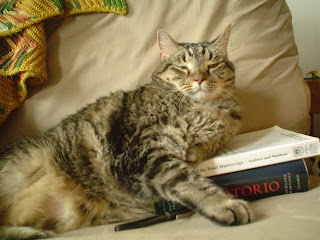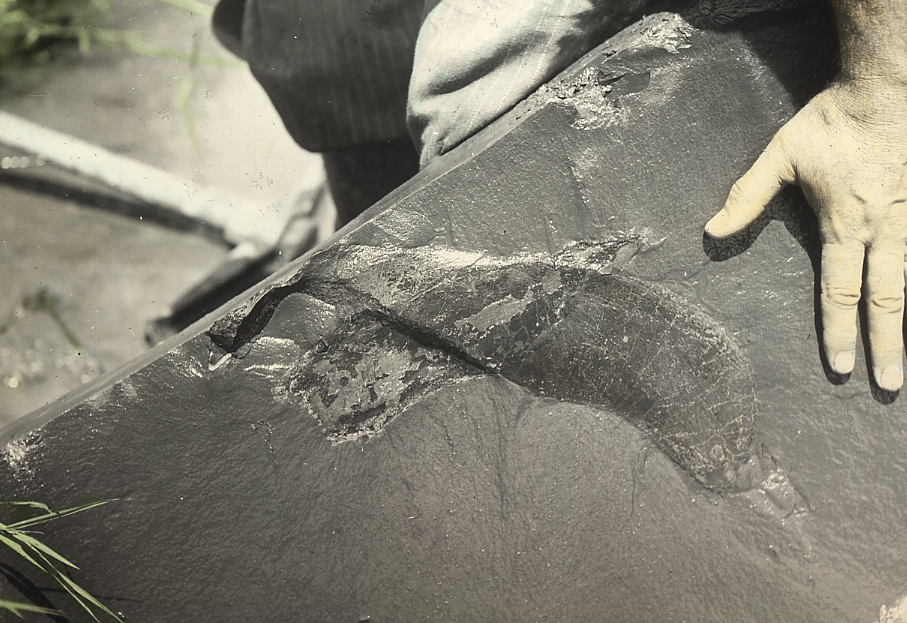We drew near; and there were persons in the shade behind the rock, in postures people take for negligence.
And one of them, who seemed weary, was sitting embracing his knees, holding his face down low between them.
“O my sweet lord,” said I, “look at that fellow: he appears more negligent than if Laziness were his sister.”
Then he turned to us and gave us his attention, shifting his face up a bit along his thigh, and said, “Now you go on up, you are so vigorous!”
Then I knew who he was and the pain that made my breath still come somewhat quickly did not prevent my going to him and when
I reached him, he barely raised his head, saying: “Have you seen clearly how the sun drives his chariot over our left shoulder?”
His lazy movements and his brief words moved my lips a little; then I began: “Belacqua, now I do not grieve
for you any longer; but tell me: why are you sitting just here? are you waiting for a guide, or have your old habits claimed you again?”
And he: “O brother, what good would climbing do? for the angel of God sitting on the threshold would not let me go in to the torments.
First it is necessary for the heavens to turn around me outside here as long as they did in my life, since I delayed my good sighs until the end,
unless prayer helps me first, which must rise up from a heart that lives in grace: what good is any other, since it is not heard in heaven?”
And already the poet was climbing ahead of me and saying: “Come along now: see, the meridian is touched by the sun, and on the shore of ocean night already covers Morocco with its foot.”
(Dante Alighieri, Purgatorio trans. Robert M. Durling, Oxford, 2003, Canto 3, 106-139,)
Dante’s Belacqua here is an old friend. Unlike others in Purgatory, his laziness is paradoxically sanctioned and while he may be-moan it, Belacqua remains a point, for the poet, of bemusement, who smiles at(?) him. But Dante, I do not think, has much admonishment for the lounging pilgrim who remains still not quite in purgatory itself. Ironically, the lazy one cannot go and lose his evil laziness by decree of God! A figure of the humorously proto-purged, of the comic, of the one languorous—of poetic ease (Durling and Martinez’s notes call him “a kind of parody of the contemplative live, of which an important part is study of the heavens”—and a good deal of Canto 3 is devoted to cosmology and geography, and Belacqua is observing the movement of the spheres...). But of the modern?
And here, Beckett’s Belacqua, heads to a party brimming with medieval scholastic allusion: with a constituency of the ‘intelligentsia’ who discuss the Wife of Bath, among them a paleographer, on named the ‘Man of Law’ as his moniker for the narrative, one—who B. meets on his way there—is a French poet of a troubardourish sort “a high brow bromide of French nationality with a diabolical countenance compound of Skeat’s [yes, that’s right folks, Skeat mentioned in the highest of high modern literature, oh this is just too good!] and Paganini’s and a mind like a tattered concordance [italics mine]”; there is a reference to the Philologists Grimm, and a femme fatale of the party whose name is, of all things Alba. While the medieval allusions specifically populate the party, ironically, the medieval is inhabiting the modern all along in Belacqua himself, an odd sometime-suicidal bicycle-loving “creature” (Beckett uses this word) who literally dreams in French and likes eating toast so burnt it will hurt his mouth when smeared with the most stinky blue cheese imaginable while on his way to study—that’s right—Italian by way of reading Dante with an old female scholar he imagines as his own private Beatrice in-the-\flesh. And, he even likes reading the Paradiso. Belacqua has just been physically reprimanded for unknowingly (in a drunken stupor) throwing up on a policeman’s shoes:
Suddenly walking through the rain was not enough, stepping out smartly, buttoned up to the chin, in the cold and the wet, was an inadequate thing to be doing. He stopped on the crow of Baggot Street bridge, took off his reefer, laid it on the parapet and sat down beside it. The Guard was forgotten. Stooping forward then where he sat and flexing his left until the knee was against his ear and the heel caught on the parapet (admirable posture) he took off his boot and laid it beside the reefer. Then he let down that leg and did the same with the other. Next, resolved to get full value from the bitter no’-wester that was blowing, he slewed himself right round. His feet dangled over the canal and he saw, lurching across the remote hump of lesson Street bridge, trams like hiccups-o’-the wisp. Distant lights on a dirty night, how he loved them, the dirty low-church Protestant! He felt very chilly. He took off his jacket and belt and laid them with the other garments on the parapet. He unbuttoned the top of his filthy old trousers and coaxed out his German shirt. He bundled the skirt of the shirt under the fringe of his pullover and rolled them up clockwise together until they were hopped fast across his thorax. The rain beat against his chest and belly and trickled down. It was even more agreeable than he had anticipated, but very cold. It was now, beating his bosom thus bared to the mean storm vaguely with marble palms, that he took leave of himself and felt wretched and sorry for what he had done. He had done wrong, he realized that, and he was heartily sorry. He sat on, drumming his stockingbird heels sadly against the stone wondering whence on earth could comfort spring, when suddenly the thought of the bottle he had brought pierced his gloomy condition like a beacon.
(Samuel Beckett, “A Wet Night,” More Pricks than Kicks, in Samuel Beckett: The Centenary Edition, Vol. IV,129)
I should note that we first meet Belacqua in the story “Dante and the Lobster,” which opens:
It was morning and Belacqua was stuck in the first of the canti of the moon. He was so bogged that he could move neither backward nor forward. Blissful Beatrice was there, Dante also, and she explained the spots on the moon to him. She shewed him in the first place where he was fault, then she put up her own explanation. She had it from God, therefore he could rely on its being accurate in every particular. All he had to do was to follow her step by step. Part one, the refutation, was plain sailing. She made her point clearly, she said what she had to say without fuss or loss of time. But part two, the demonstration, was so dense that Belacqua could not make head or tail of it. The disproof, the reproof, that was patent. But then came the proof, a rapid shorthand of the real facts, and Belacqua was bogged indeed. Bored also, impatient to get on to Piccarda [since when is Belacqua impatient? only, only with Beatrice! and who else would dare!]. Still he pored over the enigma, he would not concede himself conquered, he would understand at least the meanings of the words, the order in which they were spoken and the nature of the satisfactions that they conferred on the misinformed poet, so that when they were ended he was refreshed and could raise his heavy head, intending to return thanks and make formal retraction of his old opinion.
(Beckett, “Dante and the Lobster,” More Pricks and Kicks, 77)
Beckett’s Belacqua is in fact a student of Dante. So much that the language here has him learning from Beatrice as much if not more than Dante himself, having the advantage of a text to go over and over and his Italian tutor, as opposed to just Beatrice’s oral instruction, however blissful and blessed. That is, Belacqua is a kind of anachronism delightful to the kind of literary history I like—the kind I want to uncover as the literary history proper to a moderism with a radiant Middle Ages at its heart.
For Dante, Belacqua should not be in the Paradiso learning from Beatrice at the same time as Dante—who would have B. still lazing around the very bottom of purgatory. Perhaps, of course, by the time that Beckett and 20th century Ireland have come about (one with medievalists and paleographers and philologists!), Belacqua (chez Dante) will have made it at least up in the conical realms and perhaps all the way to the blessed city. Yet, in that case, he should certainly not be stealing bicycles and walking stinking drunk in the rain in Dublin. His conversion is lazy and late, but how can we possibly have so much ease, so much reluctance to give up on the worldly that it might even leech out into a 20th century version of himself? Well, praise, for the trans-historical Belacquas! For, Beatrice and Dante are “there” and only “there.” Not, “there in the text” but “there.” In the text, but the only text at the moment—the text of Belacqua, and in that one they are just ‘there.’ Also, Beatrice “shewed” all of her arguments—but in the very same past tense of the general narrative itself. She may have ‘shewed’ them to Dante, but then she also shewed them to Belacqua during the time of this narrative here! Huzzah for the poetics of anachronism! Huzzah for Belacqua, the scholar of ease! He takes off his shoes and raincoat, un-tucks his shirt, drinks, and eventually will show up to the party anyway. In the words of a David Byrne song I heard performed last night for free in Prospect Park:
Everything that happens will happen today
& nothing has changed, but nothing's the same
and ev'ry tomorrow could be yesterday
& and ev'rything that happens will happen today
And then I look over and see Marge, my cat, dearest Margery Kempe-cat, who understands Dante, and Dante’s Belacqua, better than me, perhaps than Beckett, and just about anyone save maybe Franco Masciandaro—the soft sleepy lazing anti-purgatory of ease and pleasure, a purgatory under erasure, behold:


No comments:
Post a Comment